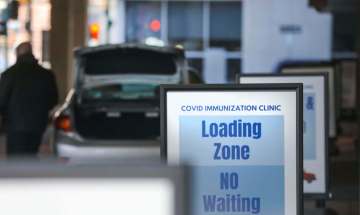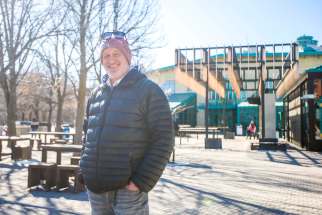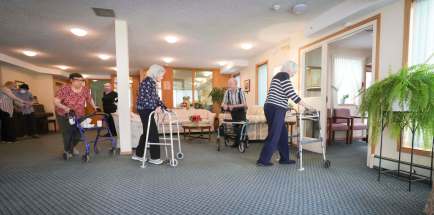Patience a COVID virtue Easter, Passover gatherings tempting return to normalcy, especially for people who've been vaccinated, but health experts warn it's way too soon, because things could easily spiral out of control again
Read this article for free:
or
Already have an account? Log in here »
To continue reading, please subscribe:
Monthly Digital Subscription
$0 for the first 4 weeks*
- Enjoy unlimited reading on winnipegfreepress.com
- Read the E-Edition, our digital replica newspaper
- Access News Break, our award-winning app
- Play interactive puzzles
*No charge for 4 weeks then price increases to the regular rate of $19.00 plus GST every four weeks. Offer available to new and qualified returning subscribers only. Cancel any time.
Monthly Digital Subscription
$4.75/week*
- Enjoy unlimited reading on winnipegfreepress.com
- Read the E-Edition, our digital replica newspaper
- Access News Break, our award-winning app
- Play interactive puzzles
*Billed as $19 plus GST every four weeks. Cancel any time.
To continue reading, please subscribe:
Add Free Press access to your Brandon Sun subscription for only an additional
$1 for the first 4 weeks*
*Your next subscription payment will increase by $1.00 and you will be charged $16.99 plus GST for four weeks. After four weeks, your payment will increase to $23.99 plus GST every four weeks.
Read unlimited articles for free today:
or
Already have an account? Log in here »
Hey there, time traveller!
This article was published 01/04/2021 (1717 days ago), so information in it may no longer be current.
Manitobans can see a light at the end of the COVID-19 tunnel as vaccine supplies are arriving in greater volume and the immunization effort is gradually ramping up.

But experts warn that Easter and the end of Passover this weekend are not reasons to throw caution to the wind, even for people who’ve received a dose — or two — of a vaccine.
University of Manitoba virologist Jason Kindrachuk says there are some less-risky ways to gather over the weekend, but emphasizes we’re a long way from being out of the woods.
“We all see the benefits in real time of what the vaccines have been providing… but we can’t get ahead of ourselves,” he says.
What do officials say about holiday gatherings?
Don’t risk it.
Manitoba’s chief public health officer is urging people to stick with the current rules of gathering only within your household or with two designated visitors.
“The more people gather, the more transmission we are going to see,” Dr. Brent Roussin said.
Like most provinces, Manitoba saw waves of COVID-19 infections following Thanksgiving and Christmas get-togethers.
“We have to remember what happened, and we have to make sure it doesn’t happen again this Easter and Passover season, and let that never happen again,” Premier Brian Pallister said recently.
What changes for people who are vaccinated?
The three vaccines currently available in Canada are most effective two weeks after receiving the second dose. It’s unclear how much protection comes before that point.
Data suggests it’s nearly impossible for someone to die of COVID-19 once they’re fully immune, though they might still become ill. And studies increasingly indicate someone who has had both shots is dramatically less likely to pass along the coronavirus to others, but that doesn’t mean it’s not possible.
“We’re not at that point where we have enough vaccine coverage in the community to actually make a big dent,” Kindrachuk says.
Grandma got both shots before mid-March; can she hug her grandkids?
Just 1.6 per cent of Canada’s population had received a second dose as of two weeks ago, and many of those people live in the Territories.
While many assisted-living residents have been immunized, they could still carry the coronavirus and infect other people by transmitting it to children, who then spread it to parents and friends.
“An individual might have that level of protection, but it doesn’t mean your community does,” Kindrachuk says, arguing that more-contagious variant strains of the virus make it difficult to gauge the risk.
“We don’t understand what this looks like, in regards to transmission and subsequent transmission within communities, across different age groups.”
However, he acknowledged that many people will probably accept that risk with a grandparent who lives alone, or in a communal facility where all the staff and residents got their second shot two weeks ago.
Meeting outdoors, wearing masks and keeping a distance make those gatherings safer.
What about people who got the first dose?
Real-world data suggest the first dose starts to gradually provide some protection, particularly against death and, to a lesser extent, severe COVID-19 symptoms.
However, Public Health England has observed that Britons who got their first shot seemed to be taking more risks, based on a higher infection rate and more contacts than those in the non-vaccinated population.
Kindrachuk says the immunity provided by the first dose likely hinges on the state of someone’s immune system.
“That glove doesn’t fit every hand,” he says. “The social determinants of health affect different populations.”
For example, First Nations in Manitoba have documented 30 cases of COVID-19 infection within 28 days of receiving a first shot.
Officials suggest that’s due to a high prevalence of the health issues that make COVID-19 more severe in First Nations communities. Crowded living conditions on reserves translate into higher infection rates for contacts compared to people in the overall Manitoba population.
That’s why people in remote communities will get their second doses ahead of most Winnipeggers.
How come Americans can gather?
They’re far ahead of us, with nine times the proportion of people who are fully vaccinated, thanks to ample supply that includes the single-dose Johnson and Johnson vaccine, not yet approved for use in Canada.
The U.S. Centers for Disease Control announced March 8 that fully immunized people can have visitors. On that date, 9.4 per cent of Americans were fully vaccinated, compared with 1.5 per cent of Canadians; we are now at 1.8 per cent.
“We’re now a little bit behind the 8-ball,” Kindrachuk says. “We see where things are going, but we just don’t have that coverage yet.”
Some provinces have botched mass-vaccination site operations and online registration, in part because they don’t have enough shots to simply open up registration to all adults.
Didn’t we already vaccinate the most vulnerable people?
Yes, but more contagious and deadlier COVID-19 variants are putting more pressure on hospitals.
“We’re seeing a lot more younger (patients) over-represented in those hospitalizations,” Kindrachuk says.
The strain on ICU wards limits the ability to respond to things that have nothing do do with COVID-19, such as car crashes or heart attacks.
“We’ve certainly done our due diligence in trying to get vaccines out to the highest age groups… but that doesn’t give us all the protection we need for what we’re facing right now,” Kindrachuk says.
I’m so tired of this.
Surveys suggest Canadians’ mental health has deteriorated over the course of the pandemic. The increasing number of cases linked to variants and the many changes in the use of the AstraZeneca vaccine are dampening some of the hope that accompanied the first shipments of vaccines.
“Prior to the last few weeks, things looked like they were turning in the right direction,” Kindrachuk says. “Everybody’s been doing this for months on end; we’re all extremely tired of it, even those of us that are working on the virus.”
Yet there is still plenty to look forward to.
Over the past few weeks, vaccine manufacturers reported an increase in shipments to Canada, well ahead of what was originally planned. Even with trade disruptions abroad, there are good signs that all adult Canadians will be able to get a shot before the fall.
And preliminary data suggests the Pfizer-BioNTech and Moderna vaccines work well on youths age 12 to 15, leading to hopes of a normal 2021-22 school year.
The short-term pain of avoiding a big Easter gathering will make it more likely that it will be an enjoyable summer.
“We know how quickly the situation can escalate out of control, and we need a bit longer,” he says. “We have to make those right decisions, to get to where we want to be later this year.”
Shouldn’t we have national guidance?
Prominent health experts are calling on Ottawa to release standard guidance for people to reduce their risk, instead of leaving it to individuals to decide if and how they’ll skirt the rules.
That’s the harm-reduction approach behind sexual education and guidance on illicit drugs, aimed at empowering people to limit their risk, instead of simply telling people to abstain.
Even the co-chair of Ottawa’s arm’s-length panel on vaccine usage says we’re past due for some official advice on how immunized people can gather.
“Canadians want to know what are the next steps,” Dr. Caroline Quach-Thanh told the National Post last month.
“We have asked that same question of the Public Health Agency of Canada.”
PHAC says it’s looking into some kind of guidance, but insists on sticking with the basics of avoiding crowds and indoor gatherings, wearing masks and washing hands.
dylan.robertson@freepress.mb.ca








